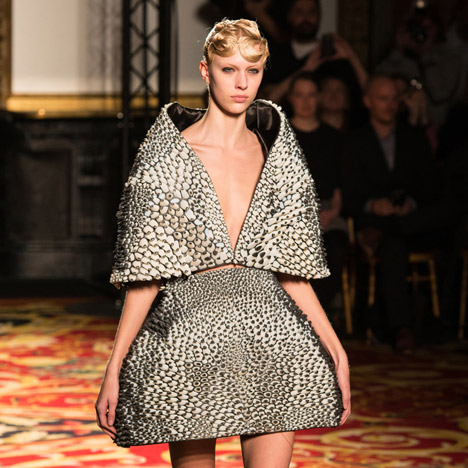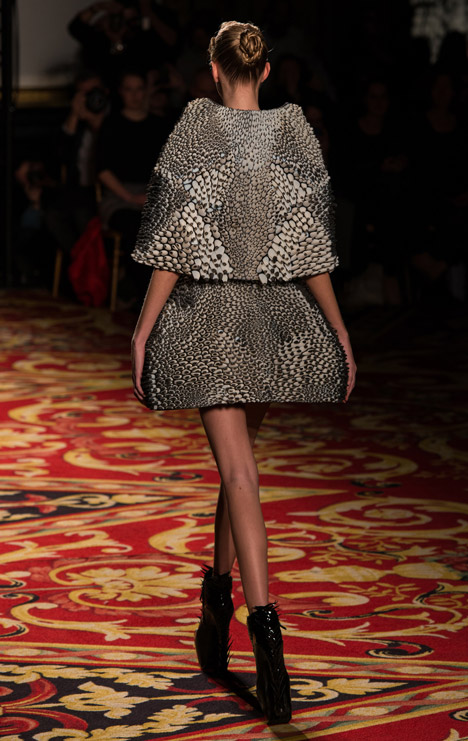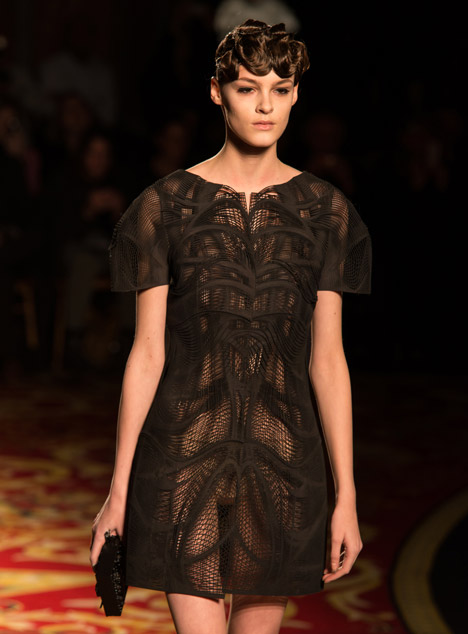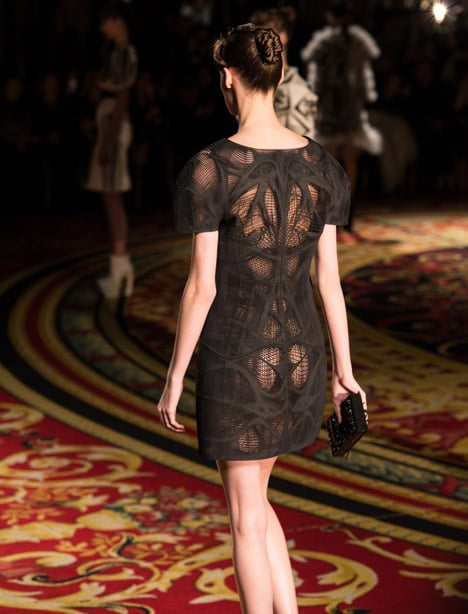
Voltage by Iris van Herpen with Neri Oxman and Julia Koerner
Dutch designer Iris van Herpen debuted two 3D-printed outfits made in collaboration with US-based designer Neri Oxman and Austrian architect Julia Koerner during her runway show at Paris Fashion Week yesterday.

Van Herpen’s 11-piece collection features two 3D-printed ensembles, including a skirt and cape produced in collaboration with 3D print specialist Stratasys and Neri Oxman, who leads the Mediated Matter Group at Massachusetts Institute of Technology.
Stratasys used multi-material 3D technology to incorporate both hard and soft materials within the skirt and cape. "The ability to vary softness and elasticity inspired us to design a 'second skin' for the body acting as armour-in-motion," said Oxman. "In this way we were able to design not only the garment’s form but also its motion."

A black dress was designed with Julia Koerner and printed by Belgium-based firm Materialise. The intricate texture of the dress was created through selective laser sintering, a process that uses a laser to fuse small particles together.
"The architectural structure aims to superimpose multiple layers of thin woven lines, which animate the body in an organic way," said Koerner.

Van Herpen first showed 3D-printed clothes as part of her Spring/Summer 2010 collection, which she developed with more 3D-printed designs in 2011.
Other designs by van Herpen we've featured include a pair of shoes with fangs protruding from their soles and another pair with spikes made from semi-precious stones.
See all stories about fashion »
See all stories about 3D printing »
Here's the press release from Stratasys:
Wearable Stratasys and Materialise 3D Printed Pieces Hit Paris Fashion Week at Iris van Herpen Show
Iris van Herpen collaborates with Prof. Neri Oxman, Julia Koerner, Stratasys and Materialise for latest fashion collection
Stratasys, a leading manufacturer of 3D printers and production systems for prototyping and manufacturing and Materialise, a Belgian-based pioneer in Additive Manufacturing software and solutions, today announced the unveiling of 3D printing collaborations on the catwalks of Paris Fashion Week as part of Iris van Herpen’s Haute Couture show, ‘VOLTAGE’.
Dutch designer van Herpen’s eleven-piece collection featured two 3D printed ensembles, including an elaborate skirt and cape created in collaboration with artist, architect, designer and professor Neri Oxman from MIT’s* Media Lab, and 3D printed by Stratasys. An intricate dress was also designed in collaboration with Austrian architect Julia Koerner, currently lecturer at UCLA Los Angeles, and 3D printed by Materialise, marking the second piece created together with Koerner and the ninth with Materialise.
The 3D printed skirt and cape were produced using Stratasys’ unique Objet Connex multi-material 3D printing technology, which allows a variety of material properties to be printed in a single build. This allowed both hard and soft materials to be incorporated within the design, crucial to the movement and texture of the piece. “The ability to vary softness and elasticity inspired us to design a “second skin” for the body acting as armor-in-motion; in this way we were able to design not only the garment’s form but also its motion,” explains Oxman. “The incredible possibilities afforded by these new technologies allowed us to reinterpret the tradition of couture as “tech-couture” where delicate hand-made embroidery and needlework is replaced by code.”
Van Herpen adds, “I feel it’s important that fashion can be about much more than consumerism, but also about new beginnings and self-expression, so my work very much comes from abstract ideas and using new techniques, not the re-invention of old ideas. I find the process of 3D printing fascinating because I believe it will only be a matter of time before we see the clothing we wear today produced with this technology, and it’s because it’s such a different way of manufacturing, adding layer-by-layer, it will be a great source of inspiration for new ideas.”
According to van Herpen, motivation to collaborate with Oxman came after seeing her ‘Imaginary Beings : Mythologies of the Not Yet’ collection – 3D printed by Stratasys’ matchless Objet Connex multi-material 3D printing technology – that featured in the Multiversités Créatives exhibition at the Centre Pompidou, Paris, last spring. Oxman explains that the joint venture is very much an extension of the series:
“This project has taken ‘Imaginary Beings’ to ‘Wearable Beings’, myths that one can wear. The original collection includes 18 Stratasys 3D printed prototypes for the human body inspired by Jorge Luis Borges' Book of Imaginary Beings. They are human augmentations inspired by nature; but not all wearable. For Iris’ collection at Paris Fashion Week it was important to take the series to the next level, thinking not only about form and materials, but also about movement and wearability. This was a new challenge for me and for my colleagues – Prof. W. Craig Carter (Department of Materials Science & Engineering) and Keren Oxman. It inspired us to design algorithms that could map physical movement and material behaviour to geometrical form and morphological variation in a seamless and continuous wearable surface.”
Van Herpen, Koerner and Materialise have continued testing the limits of 3D printing with this 3D printed dress, proving once again that normal rules don’t apply when fashion and high technology combine. In last season’s ‘Hybrid Holism’ collection, they first introduced the use of Materialise’s Mammoth Stereolithography machines for a stunning semi-transparent dress that one spectator compared to liquid honey. For this latest collection, ready for an even greater challenge, an experimental new material was put to use in the creation of a flexible, soft dress of stunning complexity. The piece’s intricate lace-like texture was created with precision by lasers (in a process known as Laser Sintering) and would have been impossible to realise any other way.
Julia Koerner explains, “My collaboration with Materialise for the 3D printed dress for Iris van Herpen's Haute Couture Show 'Voltage' 2013 reveals a highly complex, parametrically generated, geometrical structure. The architectural structure aims to superimpose multiple layers of thin woven lines which animate the body in an organic way. Exploiting computational boundaries in combination with emergent technology selective laser sintering, of a new flexible material, lead to enticing and enigmatic effects within fashion design. New possibilities arise such as eliminating seams and cuts where they are usually placed in couture.”
Following the Paris Fashion Show, the skirt and cape will be exhibited at MIT’s Media Lab.